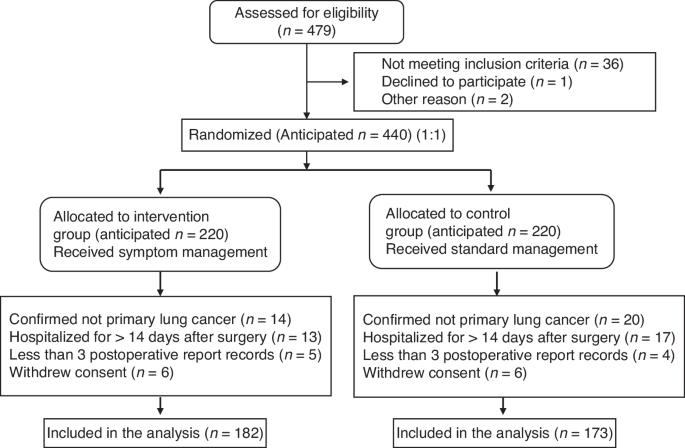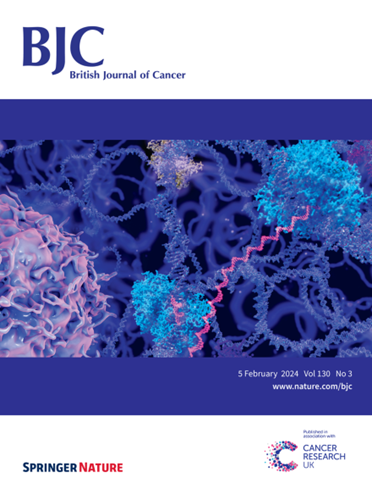基于电子患者报告结果的生理和心理症状管理:TD-WELLBEING随机临床试验。
IF 6.8
1区 医学
Q1 ONCOLOGY
引用次数: 0
摘要
背景:全球三分之一的肺癌病例发生在中国。本研究评估了基于电子患者报告结果(ePRO)的干预对肺癌手术后疼痛和心理困扰等术后症状的症状管理效果。方法:纳入肺癌手术患者(2022年4月- 2023年10月;年龄18 ~ 75岁,ECOG评分0 ~ 2分,预期生存期0 ~ 6个月,随机分为对照组和干预组。后者完成MDASI-LC和QLQ-C30问卷,其中高症状得分提示治疗建议;前者接受常规护理。通过基于epro的症状管理疗效评估的调查和访谈,在12周和1年内评估症状评分、日常功能和生活质量的变化。结果:355名参与者分为干预组(n = 182)和对照组(n = 173)。在12周时,前者的症状阈值明显降低[0 (0-1)vs. 1(0-3)],症状评分较低[调整后平均差为-0.527 (95% CI: -0.788至-0.266)],生活质量评分较高(情绪功能:2.908;95% ci: 0.600 ~ 5.216, p = 0.014;全球卫生:6.775;95% ci: 3.967-9.583)。结论:基于epro的协同管理有效减轻了术后负担,提高了术后6个月后的生活质量。本文章由计算机程序翻译,如有差异,请以英文原文为准。

Physiological and psychological symptom management based on electronic patient-reported outcomes: the TD-WELLBEING randomized clinical trial
One-third of all lung cancer cases globally are reported in China. This study evaluated the symptom management efficacy of an electronic patient-reported outcomes (ePRO)-based intervention for postoperative symptoms like pain and psychological distress after lung cancer surgery. We included lung cancer surgery patients (April 2022–October 2023; age, 18–75 years) with ECOG scores of 0–2 and expected survival of >6 months and randomized them into control and intervention groups. The latter completed MDASI-LC and QLQ-C30 questionnaires, wherein high symptom scores prompted treatment recommendations; the former received routine care. Changes in symptom scores, daily function, and quality of life were evaluated over 12 weeks and 1 year through surveys and interviews for ePRO-based symptom management efficacy assessments. Herein, 355 participants comprised intervention (n = 182) and control groups (n = 173). At 12 weeks, the former had significantly lower symptoms threshold [0 (0–1) vs. 1 (0–3)], lower symptom scores [adjusted mean difference, −0.527 (95% CI: −0.788 to −0.266)], and higher QOL scores (emotional function: 2.908; 95% CI: 0.600–5.216, P = 0.014; global health: 6.775; 95% CI: 3.967–9.583). ePRO-based collaborative management effectively lessened postoperative burden and improved QOL beyond 6 months.
求助全文
通过发布文献求助,成功后即可免费获取论文全文。
去求助
来源期刊

British Journal of Cancer
医学-肿瘤学
CiteScore
15.10
自引率
1.10%
发文量
383
审稿时长
6 months
期刊介绍:
The British Journal of Cancer is one of the most-cited general cancer journals, publishing significant advances in translational and clinical cancer research.It also publishes high-quality reviews and thought-provoking comment on all aspects of cancer prevention,diagnosis and treatment.
 求助内容:
求助内容: 应助结果提醒方式:
应助结果提醒方式:


